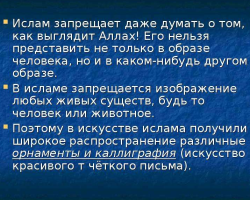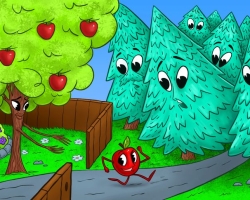If you need to perform a brief or complete analysis of Pushkin’s “Prisoner” poem, then read the article. Everything is described in detail.
Content
- How to perform a brief analysis of the poem of the poet Pushkin and Lermontov "Prisoner" 6th grade?
- A full analysis of the poem "Prisoner" of the poet Pushkin and Lermontov: Plan
- Pushkin’s verse theme "Prisoner"
- Pushkin's composition "Prisoner"
- Genre of Pushkin's poem "Prisoner"
- Means of expressiveness of Pushkin's poem "Prisoner"
- Video: "Prisoner" A. Pushkin. Analysis of the poem
- Video: Literature Grade 6. Lesson No. 9 - A. S. Pushkin. "Prisoner"
- Video: exam literature. A. S. Pushkin "Prisoner" (1822)
Alexander Sergeevich Pushkin He wrote incredible works. He conveyed with the help of poems - his thoughts that he wanted to convey to people. Another masterpiece of this poet - "Prisoner". Children study this work in the sixth grade.
Read on our website another article on the topic: "Analysis of the poem" Prophet "Pushkin". You will find a plan, questions, comparative table.
In the literature lesson, students analyze the verse "Prisoner" of Pushkin According to the genre, composition, the means of expressiveness are distinguished. Look below a brief and complete analysis of this work. Read further.
How to perform a brief analysis of the poem of the poet Pushkin and Lermontov "Prisoner" 6th grade?

A work of a poetic type with the same name "Prisoner" Present in both great poets - Pushkin and Lermontov. But, despite the similar meaning, these are completely different poetic masterpieces. A.S. Pushkin created his work during a link to Chisinau in 1822. This is how to perform a brief analysis for grade 6:
- Topic: The hero sits in imprisonment, but all his thoughts about freedom.
- He claims that the prison room will never be able to take his will from him - but not only physical, but also the freedom that is inside his nature.
- There are 4 stanzas in the form of cathedral, conditionally “prisoner” is divided into 3 hours.
- The work of the lyrical-romantic, the four-foot amphibrachia was used.
- The rhyme is written for sure, male (aavv). There are epithets and metaphors.
Pushkin realized that the existence in Bessarabia for him is torture. Especially after he shone in St. Petersburg and Moscow. The poem itself has become the symbol of human freedom from all its sides. The image can be called collective. The main character fights for freedom and wants to leave the prison walls.
As for M.Yu. Lermontov, he wrote his "Prisoner" At the time when he was in prison. The poet was imprisoned in captivity after his poem, which was dedicated to A.S. Pushkin. One valet was able to visit the prisoner. But Lermontov did not stop creating in this state. He wrote out letters on those passages of paper in which the food was wrapped in which he was fed.
- Topic: Freedom is an unattainable dream of a lyrical hero. He is also in prison - but, unlike the Pushkin "prisoner", is aware of hopelessness. Confession for him is loneliness, the inability to share his thoughts.
- Three stanzas take place in Lermontov’s verse. As well as a complete binding to the antithesis.
- At first, optimism is felt. But closer to the second stanza, the hero flows into a pessimistic mood.
- In the third part, the prisoner is simply humbled with his fate.
The main difference between creations comes out of this:
- Pushkin leaves no thought that the prisoner will be free. On the contrary, he seems to push him to leave the prison.
- And Lermontov shows a more doomed prisoner who understands that they will not go anywhere from the prison walls.
"Prisoner" of Lermontov - A lyrical poem, since you can notice the feelings of the protagonist. Basic technique: four -foot iambic. This is a great way to emphasize the tragedy of the situation. There are epithets, comparisons, personification.
A full analysis of the poem "Prisoner" of the poet Pushkin and Lermontov: Plan

In the essay you can reveal the history of writing a poem "Prisoner" of the poet Pushkin and its features. Do this according to this plan:
- What was a prerequisite for creating a poem?
- What mood the poet gives his work?
- What literary techniques help to reflect the spiritual state of the hero?
- What is the hero striving for?
"Prisoner" of Lermontov Describe according to another plan. Indicate when and how the verse was written. Also reveal the features of the poem. Here is a plan for writing:
- Which prompted M.Yu. Lermontov to create a work?
- What does the hero feel, and in what way the poet reflects his state of mind?
- What means of expressiveness are used?
- "Prisoner" of Lermontov and "Prisoner" of Pushkin: Differences
A.S. Pushkin creates his work in exile. He connects his person with a prisoner only indirectly. Most of all, the poet suffers from the lack of high -society life. They are deprived of their past contacts and remains alone with themselves. The hero of Pushkin feels that he is crowded in captivity. He is a long -free soul. Metaphors, epithets, comparisons are used.
The hero of Pushkin is eager for freedom. He believes that sooner or later it will be there. And you need to make efforts to leave your imprisonment. While Lermontov’s poem is filled with hopelessness. The prisoner understands him that he will never leave the prison and "puts the cross on himself." Below you will find a complete analysis of Pushkin's verse. Read further.
Pushkin’s verse theme "Prisoner"
Each person was born free. Therefore, if this freedom is taken from him (even as a result of his own fault), he is very difficult to survive in conclusion. The soul of the one who was in captivity is always torn out, to their native and close places. A person feels very uncomfortable without loved ones, being deprived of the usual way. This reveals the theme of this work.
A.S. Pushkin in the verse "Prisoner" He emphasizes that everything tells the prisoner about the need to leave the prison walls. Even a bird outside the window as if saying it. Most likely, the lyrical hero has been convicted undeservedly. He is eager for freedom with all his heart, although "he was fed in captivity."
It is quite obvious that, having fallen to freedom, the hero of Pushkin will continue his good undertakings. He subconsciously thinks about the escape from the prison walls. After all, he has neither desire, no time, no desire, nor time to vegetate in a dungeon. This personality is active, balanced, optimistic, with obvious inclinations of the leader. The main theme of the verse:
- The struggle is not only for their own freedom, but also with the regime.
But the “Lermontov prisoner” is not a leader and a rebel, but rather a phlegmatic and a pessimist. Conference breaks his desire for will and deprives stimuli.
Pushkin's composition "Prisoner"

Pushkin fit his sensuality and experiences in the verse "Prisoner"in 3 quatrains. These are the so -called "components" of creations. The composition of the work:
- The first (more gloomy) - is needed so that the reader feels what a person who lives in gray prison walls looks at him. But the prisoner is proud - for good reason, he associates himself with the eagle.
- It is already closer to the second part to the prisoner that it makes no sense to grieve. You need to fight for your freedom. He leaves despondency. The eagle seems to him a certain accomplice who offers to escape. And inside himself, a man agrees with this.
- In the third part, the captive is already completely sure that the long -awaited freedom and adventure await him ahead. A person does not tell in exactly what way he will break out of imprisonment. But he no longer sees a prisoner.
The bottom line is that it is possible to put a person in jail. But if he has a craving for freedom inside, then it cannot be deleted or kill.
Genre of Pushkin's poem "Prisoner"
Pushkin "Prisoner" -A work of the lyricist. Its genre is very interesting. However, rejection of restrictions adds romantic features to the lines. This is evidenced by the lines:
- "Mountain is Beating for a cloud"
- "The sea edges are blue"
- "Wind" walks "
It turns out that the main character of Pushkin is not just a fighter and rebel, but also a person with a multifaceted internal state and a creative vein. He is so similar to Alexander Sergeyevich himself. But there is no direct mention in the work that the poet speaks precisely about himself.
Size: amphibrah. Stress on a three-syllable foot on the 2nd syllable. Rhymes are written accurately (gorus), (window-one). Many male rhymes (raw, young, wing, window).
Means of expressiveness of Pushkin's poem "Prisoner"
Most of the writing techniques, in this case, are aimed at displaying two images: men and eagles. They adore the will equally. The means of expressiveness of Pushkin’s poem “Prisoner” can be described by several characteristics. A verse on the antithesis was built:
- In the dungeon raw - a mountain whitenses behind the cloud, the sea edges turn blue, only the wind and I am walking.
- The captive, a young eagle, fed in captivity, we are free birds.
There are 2 states: gray, gloomy, depressive captivity and the brightest, all -consuming will. The struggle of colors and their presence makes the work interesting.
Personification:
- Young eagle - we can say about the bird (literal meaning) and about the man (figurative meaning).
- He wants to utter - the bird can only speak with a look. What she actually does.
- We walk only the wind and I - the wind seems to be a living creature.
Pushkin here very often uses verb forms in nast. time:
- Sitting
- Calls
- Looks
- Throwing
- Walking
This is done in order to give the lines the dynamics. There are practically no complex forms. On the contrary, Pushkin focuses on simplicity. But that is why the poem is quickly remembered and easily studies.
Video: "Prisoner" A. Pushkin. Analysis of the poem
Video: Literature Grade 6. Lesson No. 9 - A. S. Pushkin. "Prisoner"
Video: exam literature. A. S. Pushkin "Prisoner" (1822)
Read on the topic:
- Analysis of the poem "Monument" Alexander Sergeyevich Pushkin
- A complete written analysis of the lyrical verse “I loved you” A.S. Pushkin
- Analysis of the poem A.S. Pushkin "Anchar"
- Analysis of the poem "To Chaadaev" A.S. Pushkin: History of creation
- Analysis of the poem "On the hills of Georgia" Pushkin







